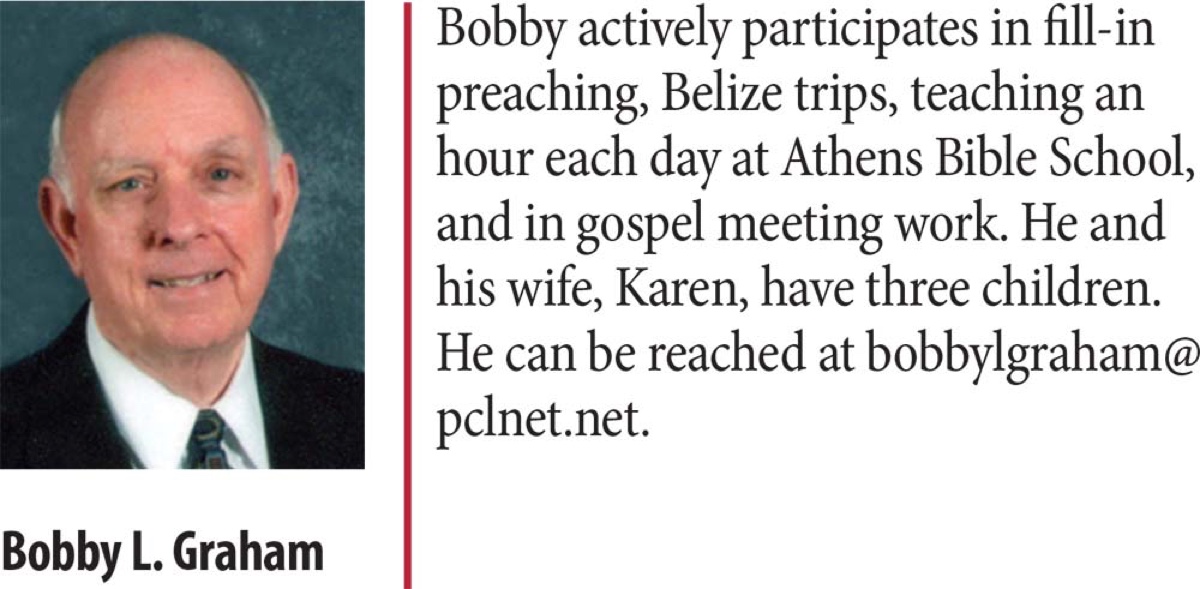

By Bobby L. Graham
Synopsis: A reader asks how the message echoing from pulpits has changed over the years.
What differences do you notice between the preaching that is heard today and the preaching in your earlier life?
Having been born in 1946 and having been reared outside Florence, Alabama, I enjoyed access to some able preachers in my growing-up years. Men like Franklin T. Puckett, Roy E. Cogdill, Robert Welch, H. A. Dickson, Earl West, Guy N. Woods, John D. Cox, James P. Miller, Granville Tyler, Lindsay Allen, Curtis Flatt, and Barney Keith were often preaching near us, sometimes in regular work and sometimes in gospel meetings. I mention these only because many still know their names as representing biblical teaching. I knew all of them and heard all of them. Solid teaching was also generally heard in rural congregations where we visited for meetings over a three-county area. A few of these able men did later follow the institutional line, when problems arose over the work of the local church in the late 1950s and 1960s. Yet, even their teaching was mostly sound and Bible-based. It was from their teaching that I learned and grew toward spiritual maturity. I actually obeyed the Gospel and then began presenting some short lessons while our family still worshiped with the old Poplar Street congregation in Florence (now Wood Avenue); division later came over the work of the church.
The teaching of those years often stressed biblical fundamentals: the inspiration of the Scriptures, the authority of Jesus Christ, the Bible as our only authority, the two covenants (old vs. new), the necessity of being in the church, the Lord’s church (New Testament church, church of Christ) as the sole church in God’s plan, water baptism being essential for salvation, denominationalism as sinful, the need to restore the church to its original pattern, the possibility of our being New Testament Christians, conversion to Christ, God’s plan for worship in the local church, the sinfulness of instrumental music in worship, the spiritual nature of the church and its work, the departure from truth when the local church’s operation is institutionalized, the heavenly hope of the redeemed, and the fearful punishment of the wicked. I might add that God’s grace was often mentioned in connection with His plan of salvation and the Christian’s hope, contrary to the claims of a few that we never heard about grace.
How long has it been since you heard lessons of this kind? Preachers, how long has it been since you preached such lessons? Elders, when have you asked a preacher to include such teaching in his sermons? Which of these topics would you find difficult to explain to someone? Yes, it is wise to balance our preaching, but omitting such “heavy” issues as these has led to ignorance of the church that Jesus built. It even becomes questionable when such imbalance causes local churches to lose their sense of belonging to Christ and our sense of being New Testament Christians. Such teaching as this definitely gave the understanding that Christians and the church of the Lord are different from men’s churches.
I understand that many issues have arisen in more recent times that trouble and agitate, all of which deserve some place in our menu of teaching. I also understand that subjects like grace, mercy, love, peace, longsuffering, and personal evangelism need inclusion. However, my experience with the profound teaching of my past, especially when combined with the Lord’s instructions to preachers in the Letters to Preachers (1, 2 Timothy, and Titus), leads me to conclude that a good part of what I hear in gospel meetings in recent years falls short of the high level of edification on which I was trained.
It may well be the case that some congregations have chosen the wrong men as elders. It also may be true that some churches have the wrong preacher. Evangelists need to quit viewing themselves as professionals trying to hold on to their positions and “shell down the corn.” Elders and churches need to quit treating them as such. Elders need to quit trying to please people and remain popular when they should be pleasing God! They should know what churches need and see that they receive it.
Perhaps another word about balance is needed. To stress such topics as I am recommending, to the exclusion of other needed matters, is just as unwise and unbalanced as the other extreme. All sin must be exposed. All virtues must be commended. All encouragement must be given. Nothing needed should be avoided. May preachers so fill themselves with the Scriptures that all of it eventually comes out in their teaching. 



